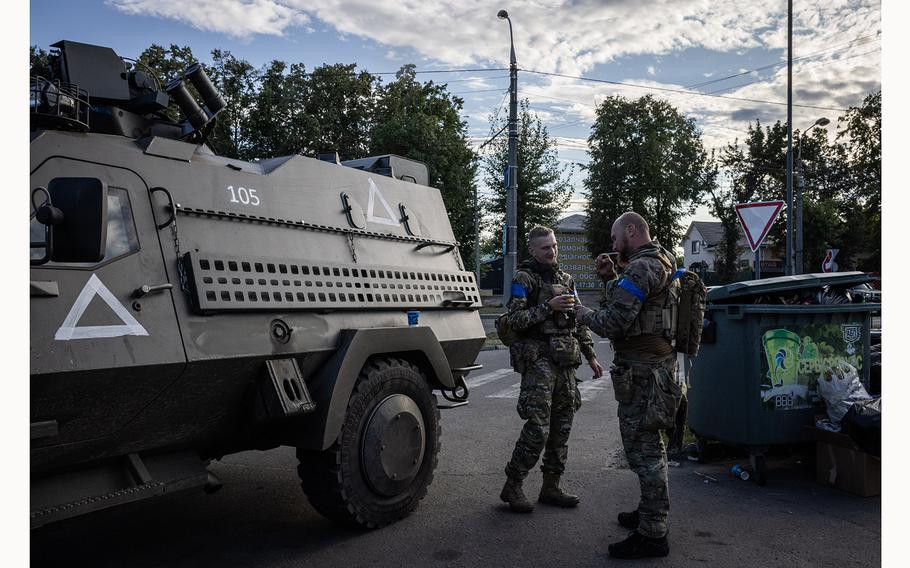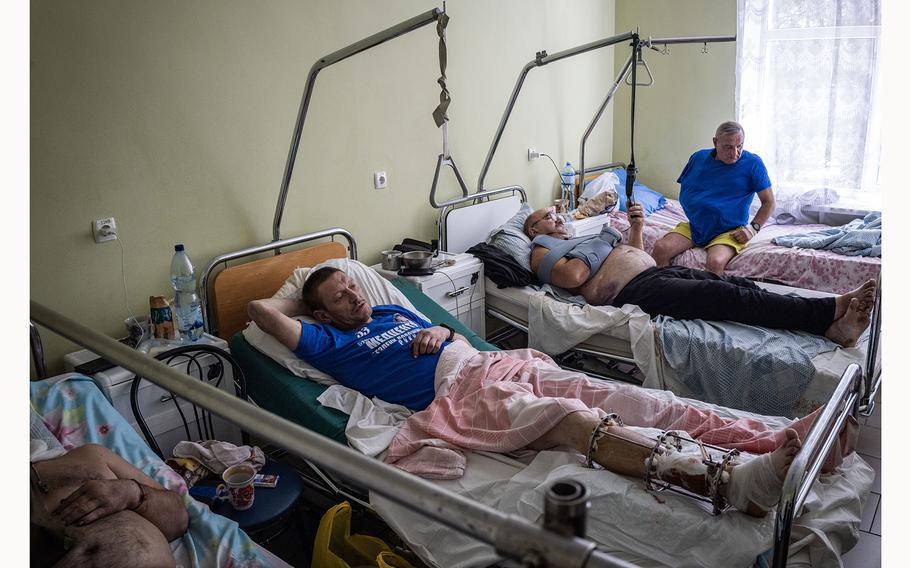Europe
Ukraine offensive in Russia expands beyond Kursk region, soldiers say
The Washington Post August 16, 2024

Soldiers drink coffee between tasks in a petrol station near Sumy. (Ed Ram for The Washington Post)
SUMY REGION, Ukraine - Ukraine’s offensive into Russia has expanded to the region of Belgorod, with fierce fighting underway there as Kyiv’s forces in the neighboring region of Kursk showed signs of solidifying control Thursday.
The new details about the fighting in Belgorod, described by Ukrainian soldiers wounded there and evacuated across the border to Ukraine’s Sumy region, came as Ukraine on Thursday appointed a military commander to manage the parts of Kursk it has taken.
Ukraine’s intelligence service also announced Thursday the detention of more than 100 Russian troops, in what it said amounted to the “largest mass capture” of enemy soldiers at one time.
The celebratory mood over the surprise advance into Russian territory persisted among many troops returning from Kursk to Sumy on Thursday to refuel their armored vehicles and buy espressos and hot dogs in Ukraine before returning to their posts across the border in Russia.
In a village close to the border crossing Ukrainian forces overran last week, the director of Ukraine’s national war museum beamed Thursday evening as he sorted through items collected by Ukrainian soldiers in Russia. He piled Russian movie posters, military uniforms and even a communist flag into the back of his silver van, saying he plans to display them in Kyiv.
But in contrast to the jubilance of some who fought in Kursk, the fighting in Belgorod has been fierce.
Three wounded Ukrainian soldiers, including one commander, described how after months of being deployed along the border, they were sent into Russia four days ago. They crossed in a fleet of armored vehicles in broad daylight, said Hacker, 24, speaking on the condition that he be identified only by his call sign, in keeping with Ukrainian military rules.
As they prepared to cross the border at Kolotilovka, in the same location where prisoners of war have previously been exchanged, Hacker recalled thinking to himself that this was a “crazy” move.
The Russian troops in Belgorod appeared prepared for their arrival, the soldiers said, in contrast to the quick advances Ukrainian units made through Kursk. Although some had retreated, the area was fortified with dragon’s teeth antitank obstacles and heavily mined. Ukrainians came under intense attack by artillery, drones and aerial bombs almost immediately.
The Ukrainians pushed forward about six miles, the soldiers said, seizing abandoned Russian troop positions. But the fighting remained intense. “All our group was injured the day we arrived,” Hacker said. Many Ukrainian troops were concussed or heavily wounded, while others were killed and had to be left behind, he said.
Shelling remained so intense that survivors had to take cover in Russian trenches for days, until an armored vehicle arrived to evacuate them for medical treatment early Thursday. Some were injured more than once as they waited for help.
Hacker said he feared he might be killed in Russia “because we didn’t know their territory.”
“We were working blind,” he added.
Russia has not acknowledged ground fighting in Belgorod, but the governor there declared a state of emergency earlier in the week.

Serhii, 48, a Ukrainian unit commander who was wounded by an FPV drone while fighting in the Belgorod region of Russia, lies in a hospital ward with other injured soldiers in a hospital in northeastern Ukraine. (Ed Ram for The Washington Post)
Among the six who were evacuated was Hacker’s commander Serhii, 48, whose right leg was badly wounded in a drone attack a day earlier. He underwent surgery immediately upon arrival in Ukraine on Thursday. “We were shelled by everything,” he said. A nurse came to adjust his bloody leg as other injured troops recuperated around him. One’s face was bloodied and swollen. Two others had injuries to their arms.
Russian forces in Belgorod may have been put on high alert after the operation into neighboring Kursk, and that could have contributed to the stiffer resistance, said Brady Africk, an open source analyst and senior media associate at the American Enterprise Institute.
That posture was probably buttressed by defensive line construction since last summer, Africk said, a buildup after cross-border raids led by Russian militias aligned with Kyiv.
“There is a pattern of Russia being attacked in a way that they didn’t expect, losing territory either temporarily or permanently, and responding by dramatically increasing the construction of defenses,” Africk said.
It is an open question whether Ukrainian forces who fought in Belgorod were aided by the same level of planning and support that aided their counterparts in Kursk, Africk said.
Despite some losses, Ukrainian officials have seized on the momentum in Kursk, with military chief Col. Gen. Oleksandr Syrsky announcing Thursday the appointment of a military commander for the region “to maintain law and order and ensure the basic needs of the population.” The announcement echoes Russia’s own moves to administer the parts of Ukraine it occupies. Meanwhile, Russian forces continued to press toward the eastern city of Pokrovsk, with regional authorities on Thursday announcing mandatory civilian evacuation from the key rail hub.
Ukrainian soldier Kniaz, 32, who stopped in Sumy to refuel his vehicle Thursday, said he has interacted with older Russian civilians across the border, including some who spoke Ukrainian and thanked the troops for their mission. “They want peace and quiet,” he said. When asked whether he believed Ukraine would try to hold onto the territory indefinitely, Kniaz, whose call sign is an ancient Slavic royal title, replied: “I don’t know … I just have to do my job.”
The detention of more than 100 Russian troops amounted to the “largest mass capture” of enemy soldiers at one time, Ukraine’s intelligence service said, amid talks that they will be exchanged for Ukrainian captives.
Speaking about the operation, which took place the previous day, a Ukrainian intelligence officer said that special forces from Ukraine’s state security service, or SBU, “captured and cleared a sprawling … and well-fortified stronghold of a company,” taking 102 Russian service members prisoner.
The captured soldiers were from Russia’s 488th Guards Motorized Rifle Regiment and the Akhmat unit, the official said, speaking on the condition of anonymity because of the sensitivity of the subject.
A video provided by the official showed dozens of soldiers lying in a line, face down in an open field. Their faces and battle insignia were not visible. The Washington Post could not independently verify the footage.
A Ukrainian official said Russia has been in contact about a prisoner swap - something it had promised to discontinue after the incursion into the southern Kursk region began.
“There was an initiative from the Russian counterpart regarding this issue. I really hope that, despite the public statements by Russian media that allegedly the Russians have decided to halt exchanges, we are still exchanging information at this time,” Dmytro Lubinets, the Ukrainian parliament’s human rights commissioner, told local media late Wednesday.
In a video address Tuesday evening, Ukrainian President Volodymyr Zelensky said that “hundreds of Russian soldiers have already surrendered.”
Ukrainian officials have said that a main reason for the surprise incursion into Russia’s Kursk region was to halt cross-border missile attacks and shelling into Ukraine’s neighboring Sumy region.
Ukraine was creating a “security zone” in Kursk, Deputy Prime Minister Iryna Vereshchuk said in a Telegram post Wednesday.
“There are Russian civilians within the specified zone,” Vereshchuk wrote. “They are under the protection of international humanitarian law, with which Ukraine fully complies.”
Russia’s efforts to take back ground in Kursk, meanwhile, have been hampered by infighting between different military and security units, according to nationalist military bloggers who are blaming various military commanders and calling for their dismissal.
After the initial swift advance, Ukraine’s progress in the Kursk region has slowed as it has faced tougher resistance. Maxar satellite images show Russian forces digging trenches in an effort to halt any possible advance toward Lgov, west of the city of Kursk.
On Thursday, Russian Defense Minister Andrei Belousov, a civilian economist appointed in May for his capacity to ramp up military production and enhance efficiency, announced plans at a meeting of regional governors to increase supplies of military hardware and manpower to the Kursk region.
The meeting appeared to be tacit admission of inadequate manpower, hardware and poor coordination in the 10 days since the attack began. Belousov said the military had prepared a plan “to enhance the efficiency of troop control in coordination with other security agencies” in the region.
On Thursday, an additional district in the Kursk region, Glushkovo, with a population of 18,000, was evacuated, taking the total number ordered to evacuate to about 180,000.
Stern reported from Kyiv and Dixon from Riga, Latvia. Serhiy Morgunov in the Sumy region, Kostiantyn Khudov in Kyiv and Alex Horton in Washington contributed to this report.